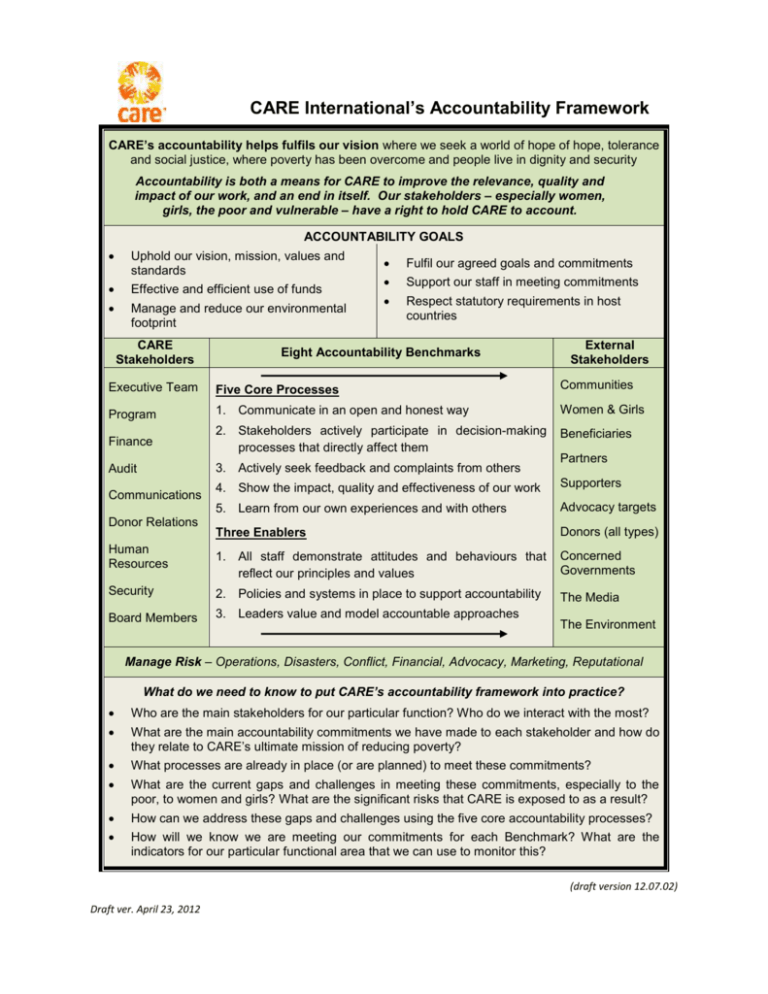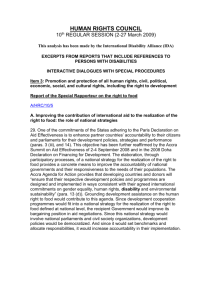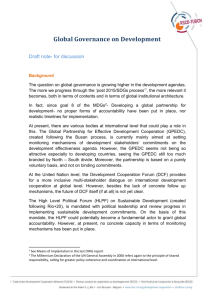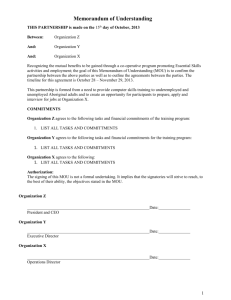Draft CARE Accountability Framework
advertisement

CARE International’s Accountability Framework CARE’s accountability helps fulfils our vision where we seek a world of hope of hope, tolerance and social justice, where poverty has been overcome and people live in dignity and security Accountability is both a means for CARE to improve the relevance, quality and impact of our work, and an end in itself. Our stakeholders – especially women, girls, the poor and vulnerable – have a right to hold CARE to account. ACCOUNTABILITY GOALS Uphold our vision, mission, values and standards Effective and efficient use of funds Manage and reduce our environmental footprint CARE Stakeholders Fulfil our agreed goals and commitments Support our staff in meeting commitments Respect statutory requirements in host countries Eight Accountability Benchmarks External Stakeholders Executive Team Five Core Processes Communities Program 1. Communicate in an open and honest way Women & Girls Finance 2. Stakeholders actively participate in decision-making processes that directly affect them Beneficiaries Audit 3. Actively seek feedback and complaints from others Partners 4. Show the impact, quality and effectiveness of our work Supporters 5. Learn from our own experiences and with others Advocacy targets Three Enablers Donors (all types) 1. All staff demonstrate attitudes and behaviours that reflect our principles and values Concerned Governments Security 2. Policies and systems in place to support accountability The Media Board Members 3. Leaders value and model accountable approaches Communications Donor Relations Human Resources The Environment Manage Risk – Operations, Disasters, Conflict, Financial, Advocacy, Marketing, Reputational What do we need to know to put CARE’s accountability framework into practice? Who are the main stakeholders for our particular function? Who do we interact with the most? What are the main accountability commitments we have made to each stakeholder and how do they relate to CARE’s ultimate mission of reducing poverty? What processes are already in place (or are planned) to meet these commitments? What are the current gaps and challenges in meeting these commitments, especially to the poor, to women and girls? What are the significant risks that CARE is exposed to as a result? How can we address these gaps and challenges using the five core accountability processes? How will we know we are meeting our commitments for each Benchmark? What are the indicators for our particular functional area that we can use to monitor this? (draft version 12.07.02) Draft ver. April 23, 2012 Accountability Framework Policy statement Introduction and Purpose All of CARE International’s member organizations share a common vision to fight against worldwide poverty and to protect and enhance human dignity with a special focus on working alongside poor women, prioritizing women’s empowerment and seeking gender equality. Along with long-term development work, responding to humanitarian emergencies is an essential part of CARE’s work to fight poverty and injustice and we recognize that emergencies are a cause and effect of both. CARE helps people cope with crises through disaster risk reduction, emergency relief, preparedness and post-crisis recovery. This Accountability Framework has two main purposes: It provides a clear statement of CARE International’s key commitments for our external stakeholders and our staff. These key commitments include both internal policies along with commitments that CARE International has made to interagency standards and principles. It aims to help our staff prioritize their work to meet these commitments in a way that ensures that views of less powerful stakeholders, including those we work with at a community level, are appropriately sought and considered. Application This Accountability Framework applies to all of CARE International’s programming, operations and governance. Guidelines for applying this Accountability Framework for staff working in different functional areas are attached as annexes. CARE managers have a specific responsibility to ensure that roles and responsibilities are clear within and between teams and that relevant recommendations from reviews and evaluations are acted upon. Core Accountability Commitments Our accountability commitments to our stakeholders will vary depending on our functional responsibilities and where we are working since CARE International staff are obliged to respect local laws. There are certain standards, principles and codes which apply to all CARE staff, namely: CARE International’s Program Framework CARE International’s Humanitarian Mandate CARE International’s Policy on the Prevent of Sexual Exploitation and Abuse CARE International’s Gender Policy The Code of Conduct for International Red Cross and Red Crescent movement and NGOs in Disaster Relief (RCRC Code of Conduct) and the People in Aid Code of Conduct. Other central accountability commitments??? Non-Negotiable Standards and Principles versus the “Good Enough” Approach A ‘good enough’ approach to compliance with this Accountability Framework is sometimes needed, notably during responses to large disasters when there is a shortage of time and capacity. Such an approach recognises that initially simple, practical measures to meet our commitments are necessary, and that these will be fully met as soon as it is feasible. Some commitments are non-negotiable, however, including the codes of conduct listed above, and the obligation to mount a prompt and effective response to the needs of disaster affected populations as per our Humanitarian Mandate. Working with and through Partners Our commitments to our stakeholders do not change when working with or through partners and it is thrus important that any relationship with partners is firmly based on mutual accountability. CARE works with partners who may at times be challenged to fulfill our commitments to minimum standards. When selecting or working with partners, any inconsistencies between the Accountability Framework and partner commitments need to be taken fully into account and incorporated into relevant MoUs, capacity building plans, and operating arrangements. In cases where the partner continues to experience Draft ver. April 23, 2012 difficulties in meeting Accountability Framework commitments or fails to respect non-negotiable standards and principles, this will normally result in terminating the relationship with the partner. Draft ver. April 23, 2012







